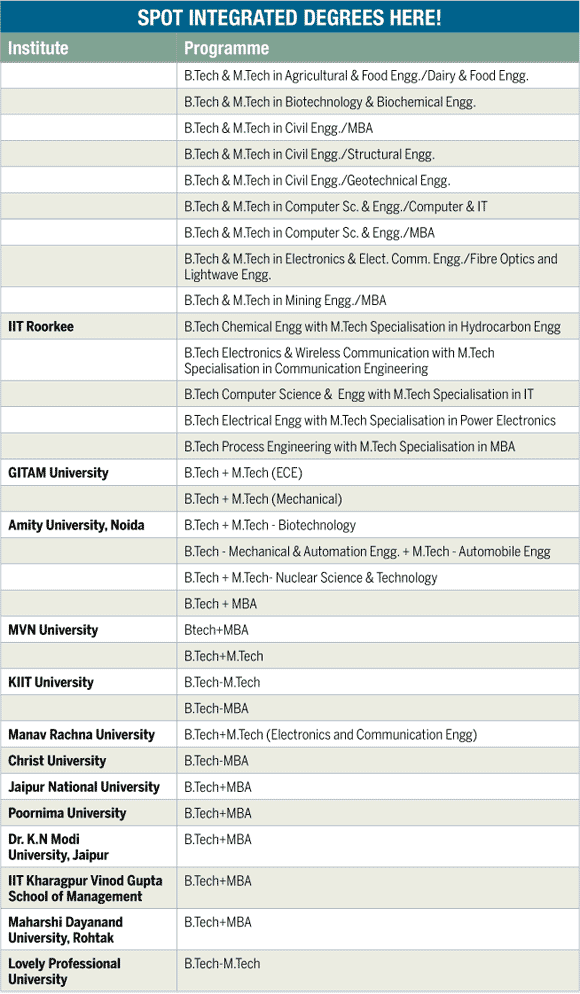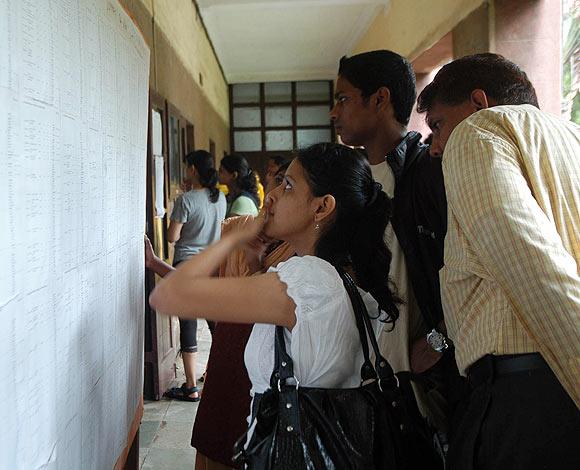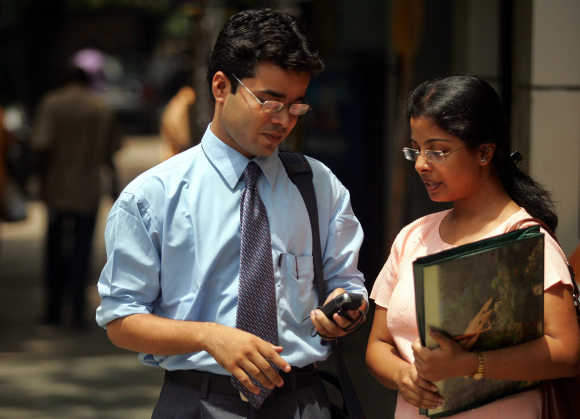 | « Back to article | Print this article |
Why are Indian students opting for dual-degree courses?
Many students have found integrated or dual degrees to be beneficial as they save time and help them build additional research skills in specific domains.
Today, Navesh Priyankar, 24, an engineer at Qualcomm, a global technology firm is happy with his choice of picking up the right degree at college.
An alumnus of IIT Kanpur, Navesh enrolled for the BTech MTech dual degree programme anticipating better placement in the market.
His hunch proved correct; he says, "If I had a BTech, then I would have not been shortlisted to work at Qualcomm. The recruiter only gave weightage to dual degree students. The attrition rate is higher for BTech graduates."
Today, besides IIT Kanpur, a host of institutions offer dual/integrated courses (both terms are interchangeable) across disciplines ranging from engineering, management and science to humanities, giving way to flexible academic structure.
Two in one
To lessen the pressure on graduates becoming unemployable in the market, the integrated programmes are designed to help students become job-ready.
It's a unique opportunity for students to pursue simultaneously two or more degrees without break.
"Some companies look for both engineering and managerial skills and find dual graduates handy. The job readiness is much higher than regular degrees. Along with BTech, you can finish MBA in just one year (4 plus 1) – so it's an accelerated learning programme," shares Prof P P Mathur, VC, KIIT University.
Please click NEXT to continue reading...
Dual advantages, joint degree attract students
It can vary from either course to course or institute to institute, starting from four to seven years.
The course may begin from intermediate till PhD.
Prof Dheeraj Sanghi, Dean Academic Affairs, IIT-K discusses the synergy of dual knowledge: “For higher studies like M.Tech, it’s always easier to train students from the same institute without repetitions. They are more tuned to our curriculum and teachers get freedom to toy with newer ideas at advanced level,” he says.
Active academic flow
Compared to a BTech student, a dual student is always on his toes!
“We study similar subjects at the BTech level. But I have an edge, as our subjects are extensively taught with different methodology,” emphasises Nida, BTech MTech (Biotechnology), third year student at Amity University.
Nida is excited that she will get a joint degree in just five years. Typically, for regular BTech and MTech, one invests six years.
The shift from conventional to integrated programmes has sparked off academic energy in many institutes. Its approach is clear enough to make students industry-ready.
“Through this innovative integrated structure, students are more exposed to critical thinking and active learning,” says Prof KC Upadhyaya, Amity Institute of Biotechnology, Amity University, Noida.
Dual-degree pursuants Nida and Mayank Sen Sharma from IIT Kanpur, sum it up as, “We feel more focused and involved in early advanced research projects without compromising on quality.”
Generally, the syllabus of dual programmes is compressed and application-based.
Flexible study options help students decide better
The option of getting into an integrated academic system is recommended only if the institute is reputed.
At the IITs, the students can avail of an MTech soon after completing third year of BTech.
“After the sixth semester, those highly motivated students who maintain a certain score of 6.5 CGPA, make a request to the faculty advisor and HOD who recommends migrating into dual,” reveals Dr K Ramamurthy, Dean, Academic Courses, IIT-Madras.
The admissions for integrated courses differ from institute to institute.
Some institutes enrol students for dual programmes from Day One.
Every institution has its own flexibility when it comes to engaging students.
At Amity, if a student finds dual structure tedious, then he can easily discontinue from doing MTech degree.
Institutes like North Eastern Regional Institute of Science & Technology (NERIST), Sant Longowal Institute of Engineering & Technology (SLIET) follows integrated certificate diploma degrees (2 2 3model).
And the Rajiv Gandhi University of Knowledge Technologies offers an integrated six-year course – a preuniversity course followed by BTech (2 4 model).
“Our idea is to catch them young. The courses are oriented in such a way that students are equipped for diploma modules at a technical level,” shares Prof Dipankar Pal, Director, NERIST.
Institutes offering the course in India

Institutes offering the course in India

Save time, money and get job-ready at the end of it!
”Saving one year in a highly competitive market is crucial. If I do M.Tech from a foreign university, I will be valued same as dual graduates. I am glad that dual helped me take early career choice,” says Mayank Sen Sharma, B.Tech M.Tech (Electrical Engineering), IIT-Kanpur.
Typically, students spend around Rs 2 lakhs on BE and 1.25 lakhs on MTech.
With a dual course, they can save around Rs 1 lakh, and there is respite from appearing for entrance tests for Master’s.
You can seamlessly acquire both degrees from the same institute, increasing efficiency of students.
Fulfilling market demands
Today, everybody is looking for specialisation. Although Bachelor’s Degree holders have a good demand in the market, industry needs an experienced lot. Here, dual degrees help greatly.
Its market value is almost the same as getting separate degrees.
Five to six years of dedicated study can get you a great job with a fat cheque.
Prof. Sanghi highlights the salary difference: “My BTechs get Rs 6 to 12 lakhs and dual graduates earn around Rs 9 to 15 lakhs per annum.”
He further adds, “Companies like Google will prefer dual graduates as opposed to BTechs. They need graduates who know research and independently solve problems.”
Degree preference differs For some students integrated studies is not a viable option.
Prof Sudhakaran, Dean Academics, VIT, Chennai reveals why he scrapped BTech-MBA integrated degree, “We saw that the number of students for dual programmes was dwindling. This is because during the BTech third year, many students are already placed with top companies. Beyond that they are not motivated to expand their academic knowledge,” he shares.
So the demand varies from institute to institute. But it is certainly, catching up well at all IITs.




